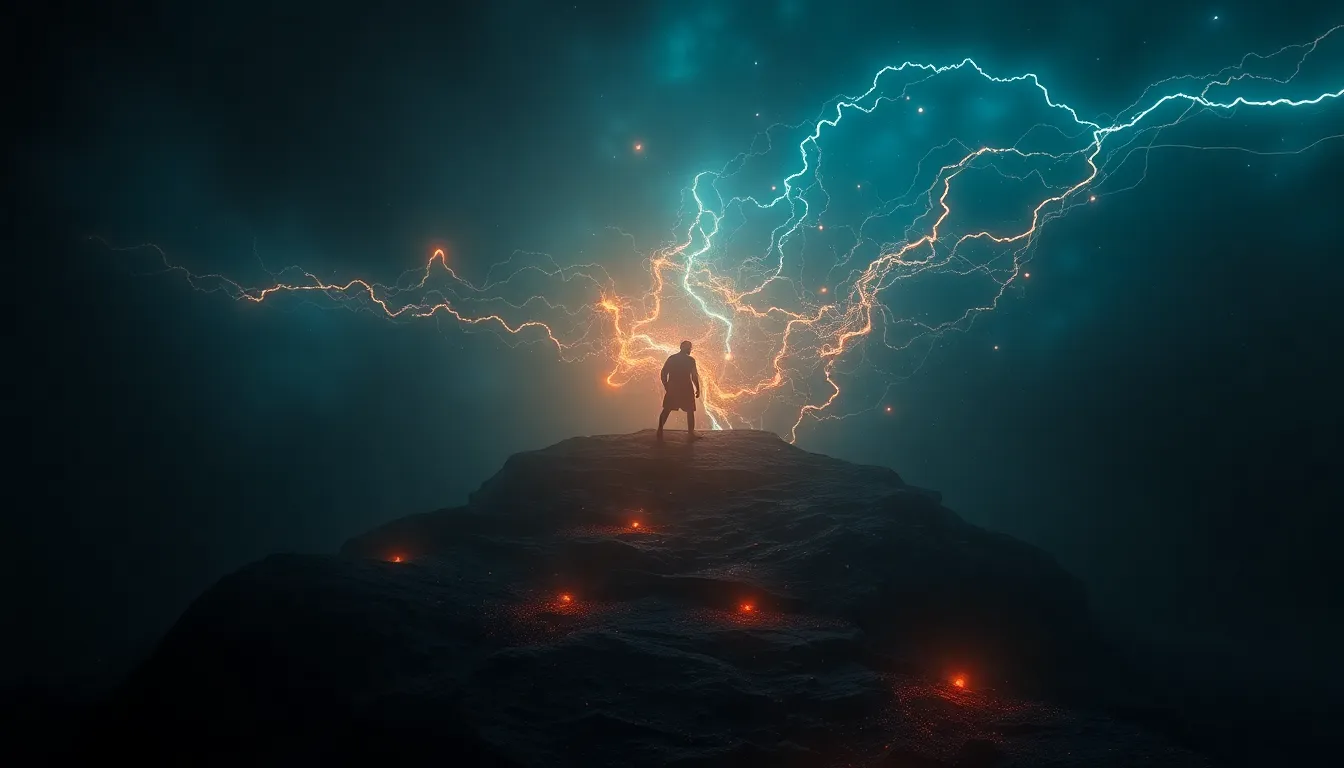Polynesian Mythology: The Significance of Ancestors
Polynesian mythology is a rich and diverse tapestry of beliefs and stories that have been passed down from one generation to another through oral tradition. Ancestors play a prominent role in these mythologies, embodying a profound connection between the past, present, and future. They are revered as guardians, protectors, and sources of wisdom. Their influence extends beyond the physical realm into the spiritual dimension, influencing everything from the creation of the world to the guidance of human affairs.
I. Ancestors as Guardians and Protectors
In Polynesian mythology, ancestors are believed to watch over their descendants, offering guidance and protection. They are seen as benevolent spirits who intervene in times of need, providing assistance in hunting, fishing, or overcoming obstacles. In many cases, ancestors manifest in dreams, offering warnings or advice, ensuring their continued presence in the lives of their kin. Ancestor spirits also possess supernatural abilities, capable of influencing natural events like controlling the weather or healing diseases. Their profound connection to their descendants creates a deep sense of responsibility, binding the living to the memory and legacy of their departed relatives.
II. Ancestral Spirits in the Creation of the World
Many Polynesian creation myths recount the role of ancestral spirits in shaping the physical realm. These spirits, often regarded as the primal forces of nature, are said to have emerged from the primordial void, giving form to the land, sky, and sea. Their actions and interactions brought forth the first living creatures and established the laws and rhythms that govern the cosmos. In some myths, these ancestral spirits are considered the progenitors of all living things, with humans being their direct descendants. This profound connection to the ancestors instills a deep reverence for the natural world, fostering a strong sense of environmental stewardship and harmony.
III. Deification of Ancestors and the Formation of the Pantheon
In Polynesian societies, the process of deification often elevates esteemed ancestors to the status of gods. These revered ancestors, with their extraordinary deeds or teachings, are enshrined within the pantheon of deities, becoming objects of worship and reverence. Their divine status serves as a bridge between the human and celestial realms, allowing for communication and mediation. By appealing to their divine ancestors, Polynesians sought guidance, blessings, and solace. The ancestors, in turn, could influence the affairs of the living, ensuring their continued welfare and prosperity.
IV. Ancestral Guidance and Intervention in Human Affairs
Polynesians believed that ancestors played an active role in influencing human affairs. Through dreams, signs, or other forms of communication, ancestors imparted wisdom and guidance. They could reveal hidden knowledge, warn of upcoming dangers, or guide individuals on the right path. Their counsel often proved invaluable in critical junctures, enabling their descendants to navigate life's complexities and make informed decisions. Ancestral spirits were also invoked during rituals and ceremonies, seeking blessings for important events, such as marriage, warfare, or the launch of a new fishing voyage.
V. Rituals and Taboos Honoring Ancestors
Polynesian societies performed various rituals and honored taboos to show reverence for their ancestors. The care of ancestral remains was of utmost importance. Elaborate burial ceremonies were conducted to respectfully send off the deceased, ensuring a safe journey to the afterlife. Specific offerings of food, prayers, and libations were made to honor and appease ancestral spirits, maintaining strong connections between the living and the dead. Taboos were observed to protect the sacredness of ancestral sites, ensuring the preservation of these revered spaces for future generations.
VI. Ancestors as Mediators between Humans and the Divine
Polynesian ancestors are not merely observers but active participants in the lives of their descendants. They serve as mediators between humans and the divine, relaying messages, offering intercessions, and influencing divine decisions. Ancestral spirits may appear in dreams or visions, providing guidance and warnings. They can also intercede on behalf of their descendants, advocating for their well-being and protection. This role as intermediaries highlights the significant connection between the living and the dead, as well as the ancestors' continued involvement in the affairs of their kin.
VII. Ancestral Presence in Literature, Art, and Music
Ancestors are not confined to the realm of oral tradition; their presence extends into various forms of Polynesian art, literature, and music. Legends and myths passed down through generations often recount the exploits, wisdom, and interventions of revered ancestors. In Polynesia, storytelling is not simply entertainment but a way to honor and preserve the memory of one's ancestors. Art forms, such as carvings, sculptures, and tattoos, incorporate ancestral motifs, paying homage to their lineage and cultural identity. Ancestral chants and songs are performed to invoke their presence, celebrate their accomplishments, and express gratitude for their enduring guidance.
VIII. Interwoven Lives: Ancestors’ Influence on Identity and Lineage
Ancestors are not just revered figures of the past; they are an integral part of Polynesian identity and lineage. Their deeds, values, and teachings shape the cultural and social fabric of Polynesian communities. Descendants take pride in their ancestral connections, carrying the weight of their legacy and striving to live up to their esteemed reputations. The lineage of ancestors determines social status, land rights, and responsibilities within the community. Ancestral connections provide a sense of belonging, purpose, and continuity, reinforcing the deep bonds between the living and the departed.
IX. Ancestral Wisdom and the Transmission of Knowledge
Polynesians highly value ancestral wisdom as a source of knowledge and guidance. Ancestors are seen as repositories of cultural traditions, practical skills, and spiritual insights. Through storytelling, rituals, and other practices, ancestral wisdom is passed down from one generation to the next. Ancestors provide valuable lessons on navigation, medicine, agriculture, and other aspects of daily life. Their wisdom helps shape the moral compass of the community, guiding individuals toward a path of righteousness and harmony. By embracing ancestral knowledge, Polynesians ensure the continuity of their cultural heritage and the preservation of time-honored traditions.
X. The Role of Ancestors in Modern Polynesian Society
In contemporary Polynesian society, the significance of ancestors remains deeply ingrained. Ancestral beliefs and practices continue to shape the lives of many Polynesians, both at home and abroad. Modern rituals, celebrations, and artistic expressions incorporate elements of ancestral reverence, ensuring that their memory and legacy live on. Ancestral guidance and protection are still sought through prayers and offerings, demonstrating the enduring connection between the living and the departed. Through the preservation of their ancestral heritage, Polynesians honor their past, strengthen their cultural identity, and forge a path forward while acknowledging the enduring presence of their ancestors.
FAQ
Q1. How do Polynesians honor their ancestors?
A: Polynesians honor their ancestors through rituals, taboos, offerings, and the preservation of cultural practices.
Q2. What is the role of ancestors in Polynesian mythology?
A: Ancestors play a multifaceted role, including guardians, protectors, creators of the world, mediators, and sources of wisdom.
Q3. How are ancestors depicted in Polynesian art and literature?
A: Ancestors are depicted in art forms such as carvings, sculptures, and tattoos, and their exploits and teachings are recounted in legends and myths.
Q4. Do Polynesians still reverence ancestors in modern society?
A: Yes, ancestral reverence remains a vital aspect of Polynesian culture, with rituals, celebrations, and artistic expressions honoring their legacy.
Q5. How does ancestral wisdom influence Polynesian life?
A: Ancestral wisdom guides Polynesians in various aspects of life, from navigation to medicine, providing valuable lessons and shaping their moral compass.



